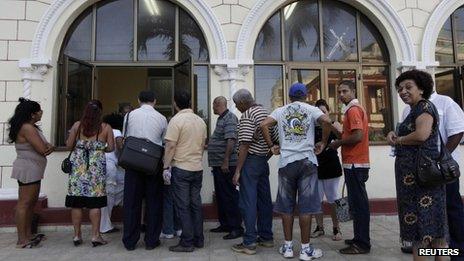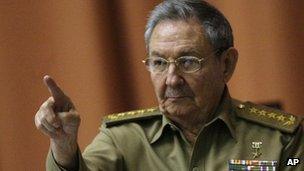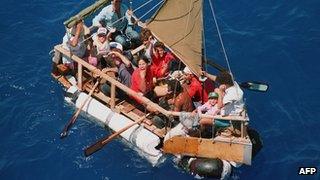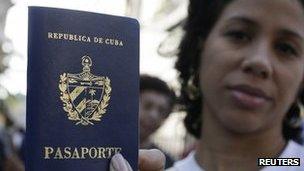Cubans set for foreign travel as exit permits abolished
- Published

Getting all the right papers used to cost far more than most monthly wages
The queues outside Havana's immigration offices have grown longer than ever in recent weeks, as Cubans rush to apply for their first passport.
It is the only Cuban document they need to travel now, as the days of requesting an exit permit to leave the island are finally over.
"I'm dying to see my daughter in the United States," said Navidad as she sheltered beneath a tree from the fierce sun. "I've not seen her in three years and just want to give her a big hug."
Another woman added that the long queues were partly because the price of a passport was doubling on Monday to $100 (£60).
"If they can't get the money off you for exit permits, they'll get it for passports," she remarked, wryly.
Previously, the total cost of all the official permits ran to around $300: at 15 times the average monthly state salary, that was a serious impediment to travel.
American dream
Cuba battened down the hatches soon after the 1959 revolution to halt a mass exodus of the island's most talented to the US. The restrictions were widely criticised outside the island, and much complained about within.
President Raul Castro promised change long ago but it was delayed, its wisdom apparently disputed by some within the Communist Party.

Cuba under Raul Castro has seen some key reforms
Now in effect, the move follows other previously unimaginable steps to loosen government control over private lives. Cubans can now buy and sell their houses and cars, for example, own mobile phones and enter hotels previously reserved for foreigners.
But despite the changes, the US - just 145km (90 miles) away across the Florida Straits - remains alluring to many.
"I want the American dream," said Daniel Reno, 23, queuing for his first passport at a once grand, private mansion that is now an immigration office.
"I want to have a good house, good wife and good car and I think it's easier to get that there. I know life's not rosy, but with hard work you can achieve things," he says, explaining that his previous salary in a state-run bank was enough to get by, but no more.
That dream is common among Daniel's generation.
The dilemma is captured powerfully in a feature film by British director Lucy Mulloy that screened here in December to big crowds.
Una Noche (One Night) depicts the personal crisis of a frustrated young man in Havana who decides to head for Miami on a raft made of inner tubes and scrap wood.

Some Cubans risked all to get to the US
In real life, many thousands of Cubans have taken the same dangerous route. Twenty years ago, Daniel Reno's father was one of them and just last year the US coastguard picked up more than 1,100 Cubans at sea.
Those who make it to shore are granted residency in the US.
The Havana government argues that these rules, that apply uniquely to Cubans, lure people into danger.
In an example of life mirroring art, the lead actors in Una Noche left Cuba. They were invited to a film festival in the US last April and stayed.
"It's because of how things are in this country; young people's material needs, the things we want and can't get here. It's the American dream," the sister of the film's female lead explained, as she emerged from the screening in Havana.
"That's why so many families are separated," said Meiylin, tears rolling down her face.
Vital workers
The new Cuban migration laws do appear to recognise that reality.

Have passport, will travel? Cubans in many cases still need visas from their intended destinations
Travellers can now stay away for two years instead of 11 months and extend that time further; those who left illegally over eight years ago will no longer face difficulties to return.
The government, which once denounced those who left Cuba as "worms" and traitors, now talks of them simply as economic migrants.
The authorities are gambling that by making it easier to travel, more Cubans will work and study abroad then bring their money and expertise back to the island.
Some restrictions do remain in place.
The law refers to "preserving the qualified workforce" and on state TV a senior immigration officer clarified that this meant athletes and "vital" professionals as well as Communist Party leaders.
"They will know […] why they are vital, which should prevent them going to get passports unless they have authorisation," Lamberto Fraga stressed. It does appear, though, that most doctors will now be far freer to travel.
The new law also specifies that anyone can be refused a passport for "reasons of public interest", and dissidents suspect that will mean them.
Some, like dissident blogger Yoani Sanchez, have been blocked from travelling many times in the past.
"1 day until the #Migration reform comes into effect and I wonder if the island's bolts will slide back for everyone? And for me?", she wrote on Twitter on Sunday.
Money
Even with passports, Cubans need visas to visit most places and as a developing country, entry requirements are strict.

For many Cubans, travelling abroad still remains a dream
The US currently issues around 20,000 immigrant visas for Cubans a year; qualifying for a tourist visa is far harder.
The state department says it is "working to ensure that mechanisms are in place" should the number of visa applications or attempted raft-crossings soar, but urged people "not to risk their lives" at sea.
Along Havana's waterfront, most Cubans doubt there will be a rush for the exit.
"People are happy with this change," said Norberto, adding that he would love to visit Paris to see the Eiffel Tower but he's realistic.
"Now, if you have friends or family abroad who can send you money, you can travel. But people like me who don't, will just have to carry on dreaming."
- Published16 October 2012
- Published9 October 2012
- Published28 April 2012
- Published8 September 2012
- Published21 July 2012